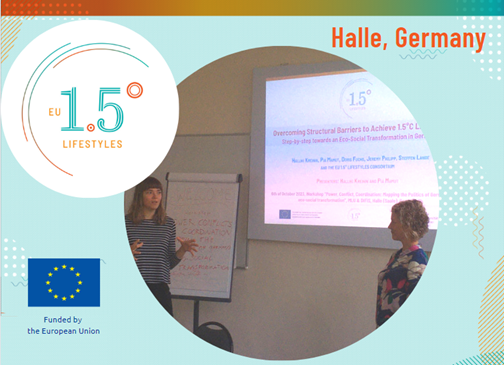
The University of Münster team has been contributing to the field of environmental and societal transformation with recent presentations of early research paper drafts as part of the EU 1.5° Lifestyles project at two events in Germany: one in Witten and another in Halle. Here are some glimpses of the early insights they shared at the events.
1. Annual Conference of the German Political Science Association (DVPW) Political Economy (PE), PPE Conference of the International Center for Sustainable and Just Transformation [tra:ce], and the Young Scholars Initiative Institute for New Economic Thinking (YSI-INET) 21-22 September 2023, University of Witten/Herdecke, Witten, Germany:
At this conference, the University of Münster team presented research on the transformative changes required to shift lifestyles and provisioning systems in Europe towards the 1.5-degree goal. Their focus was on understanding the impact of enabling and hindering structures in this process.
The research team highlighted the intricate interplay between structural factors and individual behaviors in shaping our ability to adopt climate-friendly living patterns. The work stressed the significance of identifying these structural factors and addressing them as part of the solution in different provisioning systems (mobility, housing, nutrition, leisure).
2. Workshop “Power, Conflict, Coordination: Mapping the Politics of Germany’s eco-social transformation” - 6 October 2023, University of Halle-Wittenberg, Halle (Saale), Germany (Pictured above):
In Halle, the University of Münster explored of eco-social transformation, particularly focusing on Germany's role in achieving 1.5° lifestyles. Their presentation emphasized the need for systemic changes that provide citizens with the necessary framework conditions for sustainable living. Drawing from various academic sources and highlighting the work of influential scholars, they underscored the importance of moving beyond individual behavior change and concentrating on the transformation of the societal structures that shape our daily lives.
The University of Münster's research prompts crucial questions about the "how" and "who" of eco-social transformation. It asks how we can overcome structural barriers to make the shift towards 1.5°C lifestyles and who should be involved in bringing about these changes. This is a pivotal area of inquiry, as it addresses not only the technical aspects of sustainability but also the politics and power dynamics that underlie our current systems.
The team's work contributed to the growing body of knowledge on transformations - which are not solely the responsibility of individuals but also the result of collective, systemic efforts.
Pia Mamut and Halliki Kreinin, University of Münster

